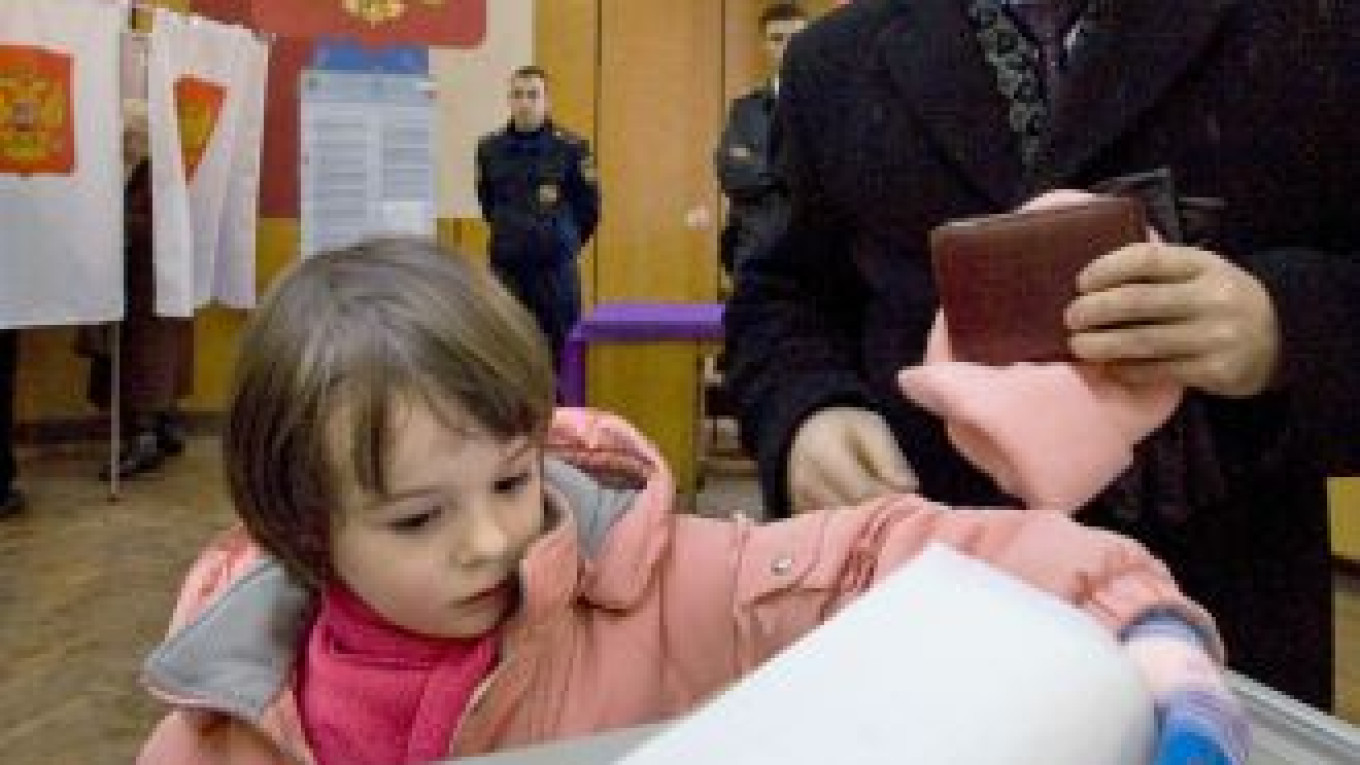Europe's top elections watchdog said Wednesday that it wants to send a 260-member observer mission for the upcoming State Duma elections, but the Central Elections Commission retorted that the figure was too high.
Ambassador Janez Lenarcic, the top official responsible for election monitoring at the Organization for Security and Cooperation in Europe, said the number was not negotiable.
"This is not a figure put on the table to have some bargaining," he told reporters in Moscow.
Lenarcic was speaking after two days of talks with government officials, including elections commission chairman Vladimir Churov, with whom he had an hour-long meeting Tuesday.
But Churov suggested Wednesday that he wanted fewer OSCE observers and that negotiations would continue. Asked whether he thought that the figure 260 was too high, he replied, "Definitely," Interfax reported.
The number, which consists of 200 short-term and 60 long-term observers, is significantly lower than in 2003, the last time the organization sent observers to a Duma vote.
The mission's size then was 460, made following an OSCE assessment that year, Lenarcic told Churov in a letter in June.
The OSCE carried out a new assessment last month, when a three-member expert mission visited Moscow. Its findings were contained in a report presented to Churov on Tuesday and by the OSCE on Wednesday.
Asked why the organization's latest assessment yielded a much lower number, Lenarcic acknowledged that the figures reflected Moscow's reservations.
"In the light of long-standing concerns surrounding the figures, we decided to come out with these figures," he said Wednesday.
The conflict about Western observers escalated in 2007 and 2008, when the OSCE made the unprecedented decision to cancel its observer missions to the Duma and ensuing presidential elections, citing unacceptable restrictions.
National media have speculated that Lenarcic, a Slovenian diplomat who in 2008 took over as director of the OSCE's Warsaw-based Office for Democratic Institutions and Human Rights, is determined to improve relations with Moscow.
Lenarcic said Wednesday that he wanted by all means to prevent another cancellation. "I sincerely wish to avoid a repetition of the 2007 scenario," he said.
He added that he hoped to receive an invitation soon. Asked about a deadline, he said that long-term observers should start working in the country five weeks before election day. The vote is on Dec. 4, meaning that observers should arrive by Nov. 1.
It was unclear Wednesday when the government would make a decision.
The elections commission said in comments on its web site about the OSCE report that it would analyze its controversial parts and continue negotiations about the mission's format.
Churov said negotiations would continue next week, when he would travel to Warsaw for talks with Lenarcic.
OSCE spokesman Jens-Hagen Eschenbächer refused to comment on Churov's decision but suggested that the organization had hoped for an easier ride. "We came to Moscow not to negotiate figures but to present our report," he told The Moscow Times.
Despite being a? founding member, Moscow has long expressed dissatisfaction with the OSCE's democratization and human rights efforts.
Earlier this month, President Dmitry Medvedev accused its election observer missions of? double standards and meddling in? internal affairs.
Lenarcic rejected the criticism Wednesday, saying that while the organization took concerns from the heads of member states "extremely seriously," Moscow could not expect special treatment. "The rules are the same for all members," he said.
The Kremlin is likely to accept OSCE observers this time, but the main catch will be about long-term monitors, said Lilia Shibanova, director of Golos, Russia's only independent election monitoring group.
Shibanova said the lower numbers looked like a diplomatic gesture.
"It seems that the OSCE decided not to scare the Russian leadership," she said.
Shibanova said 260 observers were far too few to cover the country's 95,000 polling stations, but added that the 60 long-term monitors were the most important element because "most of the violations take place before election day."
Opposition parties and activists have long complained about limited access to the media and abuse of "administrative resources" by the ruling United Russia party during election campaigns.
Shibanova said the long-term mission members should observe candidates' registration processes with local election committees and campaigns in the regions. "If they can send two observers to 30 regions that would already be of great help," she said of the OSCE.
A Message from The Moscow Times:
Dear readers,
We are facing unprecedented challenges. Russia's Prosecutor General's Office has designated The Moscow Times as an "undesirable" organization, criminalizing our work and putting our staff at risk of prosecution. This follows our earlier unjust labeling as a "foreign agent."
These actions are direct attempts to silence independent journalism in Russia. The authorities claim our work "discredits the decisions of the Russian leadership." We see things differently: we strive to provide accurate, unbiased reporting on Russia.
We, the journalists of The Moscow Times, refuse to be silenced. But to continue our work, we need your help.
Your support, no matter how small, makes a world of difference. If you can, please support us monthly starting from just $2. It's quick to set up, and every contribution makes a significant impact.
By supporting The Moscow Times, you're defending open, independent journalism in the face of repression. Thank you for standing with us.
Remind me later.


